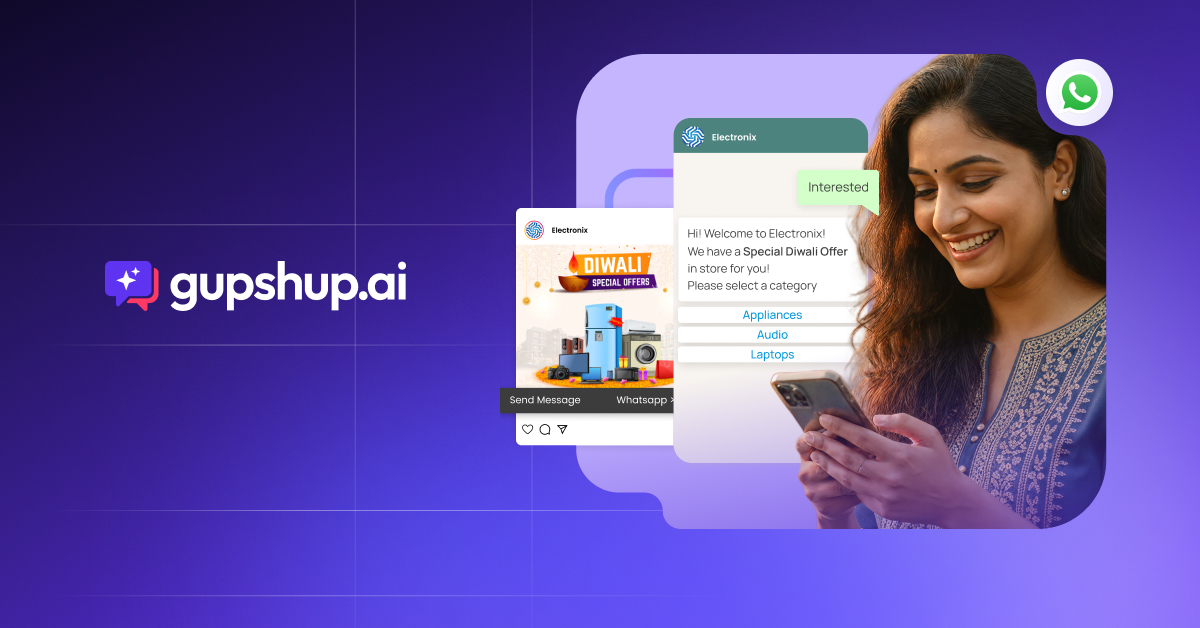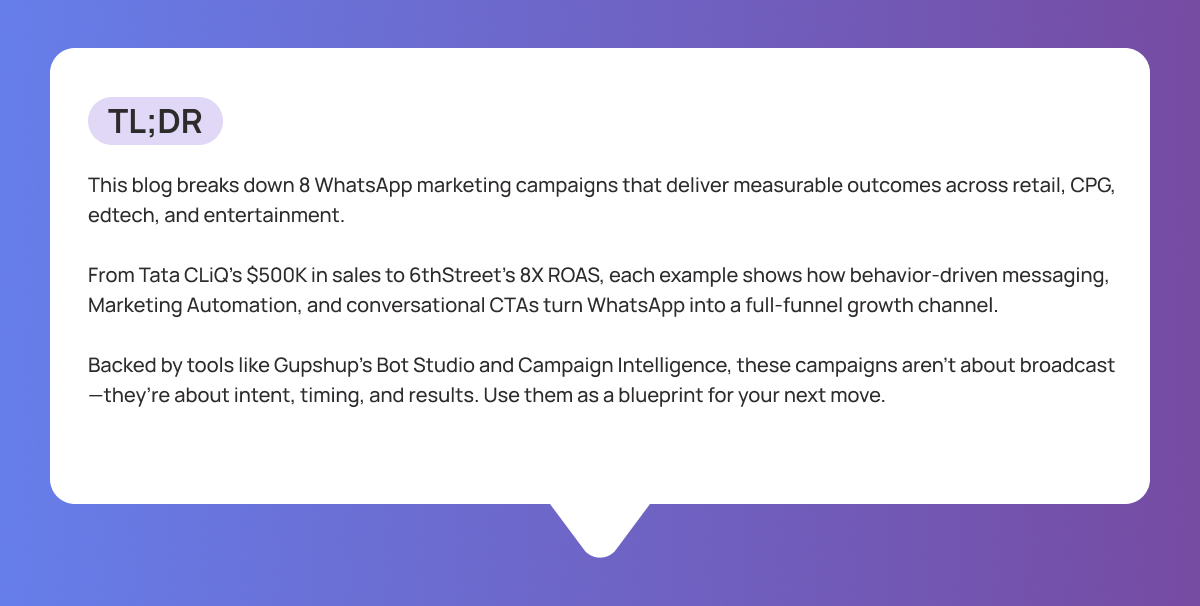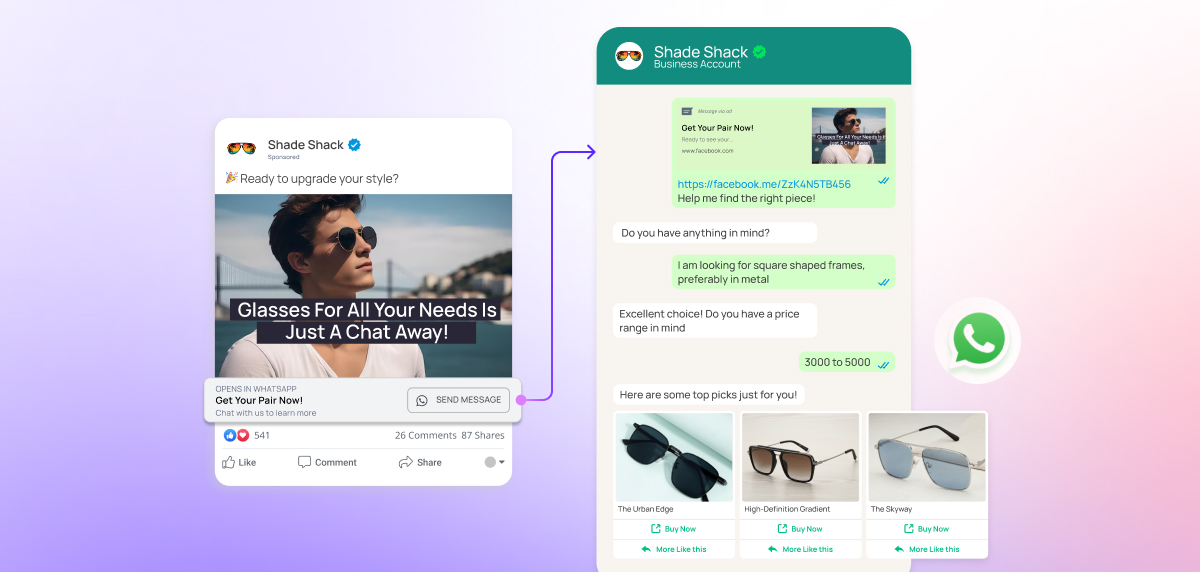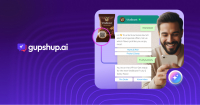8 WhatsApp Marketing Campaign Examples to Inspire Your Next Campaign

- Introduction
- Why WhatsApp Still Dominates Marketing Playbooks
- How Do You Promote Products Using WhatsApp Marketing?
- What Marketers Can Learn from These Campaigns
- Build Your WhatsApp Marketing Campaign in 4 Steps
- Conclusion: WhatsApp Marketing That Converts is Within Reach
- FAQs
See the power of intelligent conversations for your brand.
Introduction
Here’s something for you to think about – when was the last time a WhatsApp marketing message made you pause and reply?
Not click. Not delete. Actually reply.
If you can’t recall, you’re not alone. We’re surrounded by unwanted noise of push notifications, follow-ups, and exit-intent popups. But a WhatsApp message for marketing automation? That’s different. WhatsApp is where everyone is, including your competitors, customers, and likely, even your own team chat.
Why? High open rates? But that is a given.
The real difference lies in what happens after someone opens your message. Because impact isn’t measured by views, instead, it’s measured by replies, clicks, and conversions.
Smart WhatsApp marketing campaigns don’t broadcast. They start conversations. They cut through noise, build context, and stay relevant across the entire customer journey.
So, here’s what top marketing teams should be prioritizing right now:
- Conversion-ready journeys that start inside the chat
- Conversational CTAs that replace static forms and landing pages
- Full-funnel customer experiences that adapt in real time
- Personalized messaging based on behavior, not assumptions
- Fast response cycles that don’t leave customers hanging
- Targeted offers that land when they’re most relevant
This blog features eight campaigns powered by Gupshup that are built for real outcomes, featuring everything mentioned above. These aren’t one-off promos or vanity pushes. They span retail, CPG, education, and entertainment, and each one shows what WhatsApp for customer engagement actually looks like when done right.
If you’re trying to design your next move, one that is cost-efficient, easy to launch, and built to convert, then these examples are your blueprint. Let’s get into them.

Why WhatsApp Still Dominates Marketing Playbooks
Marketers continue to build on WhatsApp because it delivers direct, measurable results. It simplifies acquisition, accelerates conversion, and strengthens retention in ways that other channels no longer support.
WhatsApp marketing drives unmatched visibility
WhatsApp marketing campaigns reach users where attention still holds value.
✓ WhatsApp messages receive open rates as high as 98%.
✓ Click-through rates often reach 25 to 30%.
These numbers outperform email, SMS, and push notifications by a wide margin.
Customers already engage with WhatsApp marketing channels
An average user on Android spends over 33 minutes a day on WhatsApp. That time includes updates from friends, family, and increasingly from brands too. WhatsApp for customer engagement allows companies to meet users inside their most active, most personal space, without added friction.
Conversions don’t need redirection
WhatsApp marketing campaigns bypass traditional funnels. Click-to-chat flows eliminate the need for landing pages and forms. Customers tap, ask, reply, and purchase inside the app. This shift toward conversational CTAs improves conversion rates and reduces drop-offs.
Marketing automation powers personalization
Platforms like Gupshup enable marketing automation that triggers messages based on real customer behavior. Teams segment customers by order history, product views, or inactivity. WhatsApp marketing becomes a full-funnel engine, starting from abandoned cart nudges to loyalty rewards.
Retention finds higher response rates here
WhatsApp for customer engagement supports targeted outreach based on lifecycle stage. Campaigns for lapsed users, high-value customers, and first-time buyers all run through a single interface. Each message can reflect the user’s context, not just the campaign’s goal.
Conversations replace clicks
Customers reply to WhatsApp messages more often than they respond to emails or push alerts. This two-way format encourages feedback, clarifies doubts, and closes the gap between marketing and service.
Data stays tied to actions
Every WhatsApp marketing campaign includes trackable delivery, reads, replies, and conversions. Integrations with review platforms allow teams to collect product feedback without redirecting users. The result is a more connected, real-time marketing operation.
Now let’s see what Marketing Automation looks like in practice with some real-life examples from Gupshup.
How Do You Promote Products Using WhatsApp Marketing?

Here’s how eight leading brands redefined engagement using WhatsApp marketing, each powered by Gupshup’s automation and conversational capabilities.
1. Tata CLiQ – Personalized deals beat broadcasts
Brand & goal: Tata CLiQ, a Tata Group eCommerce platform, wanted to drive higher conversions through personalized promotional campaigns.
Missed opportunity (before WhatsApp):
- 10% email open rate
- Limited CTR from SMS due to message length and lack of interactivity
- Low engagement with static promotional content
- Inability to personalize offers based on browsing behavior
The smart move with Gupshup:
- Deployed WhatsApp campaigns via Gupshup for order updates and promotional messaging
- Used behavioral targeting to send personalized product links and cart reminders
- Implemented festive sale campaigns (e.g. Diwali, Black Friday) on WhatsApp
Result/Impact:
- $500K revenue in 4 weeks from WhatsApp alone
- 57% click-through rate
- 10X higher ROI than email, SMS, and in-app push notifications
- 1.7X higher likelihood to convert via WhatsApp than other channels
2. 6thStreet – Re-engaging dormant customers with dynamic segments
Brand & goal: 6thStreet, a leading fashion eCommerce platform in the Middle East, aimed to enhance customer engagement and drive conversions by leveraging personalized, segment-based marketing strategies.
Missed opportunity (before WhatsApp):
- Declining engagement on traditional channels like email and app push notifications.
- Limited personalization in marketing campaigns.
- Ineffective re-engagement of dormant customers.
The Smart Move with Gupshup:
- Implemented RFM-based segmentation to target customers based on recency, frequency, and monetary value.
- Deployed automated, behavior-triggered campaigns on WhatsApp for actions like cart abandonment and purchase confirmations.
- Utilized personalized product recommendations to enhance upselling and cross-selling opportunities.
Result/Impact:
- 5-8X increase in ROAS from WhatsApp marketing efforts.
- 5X improvement in abandoned cart conversions.
- 8% boost in customer recency score, indicating enhanced customer loyalty and repeat purchases.
3. Doubtnut – Daily engagement at scale in EdTech
Brand & goal: Doubtnut– an Indian edtech platform, aimed to enhance learner engagement and retention by providing accessible educational support to students, particularly in Tier 2 cities.
Missed opportunity (before WhatsApp):
- Limited app accessibility: Students in regions with low-end devices or limited data plans faced challenges using the app.
- High drop-off rates: Inability to maintain consistent engagement with students lacking reliable internet access.
- Language barriers: Difficulty in catering to students speaking diverse regional languages.
The smart move with Gupshup:
- WhatsApp chatbot deployment: Implemented a chatbot allowing students to send queries via WhatsApp and receive video solutions in 11 languages within 10 seconds.
- Interactive learning: Introduced quizzes and follow-up questions to reinforce learning.
- Broad accessibility: Ensured students without the app could still access educational content through WhatsApp.
Result/Impact:
- 260% increase in learner engagement within two months.
- 224% growth in the user base over less than a year.
- 1.8 million educational content delivered daily via WhatsApp.
- 95% user satisfaction rate indicates improved learning experiences.
4. Arha Media – Driving subscription renewals
Brand & goal: Arha Media, operating the OTT platform Aha, aimed to enhance subscriber retention and increase repeat subscriptions by delivering personalized, timely communications.
Missed opportunity (before WhatsApp):
- Low engagement: Traditional channels like email failed to capture user attention effectively.
- Limited personalization: Inability to tailor messages based on user behavior led to generic outreach.
- Inefficient payment processes: Complex payment journeys resulted in drop-offs during subscription renewals.
The smart move with Gupshup:
- WhatsApp integration: Utilized Gupshup’s Conversation Cloud to send personalized messages via WhatsApp.
- CRM synchronization: Integrated CRM data to segment users and deliver targeted content.
- In-chat payments: Enabled seamless subscription renewals within the WhatsApp chat interface.
Result/Impact:
- 10% increase in repeat subscriptions.
- 4 – 5% conversion rates for payment messages.
- 3 – 4 million messages monthly: Consistent outreach with a 38% read rate, surpassing traditional channels.
- 10,000+ users completed subscription renewals directly within WhatsApp.
5. Rajasthan Royals – Monetizing fan attention
Brand & goal: Rajasthan Royals, a prominent Indian Premier League (IPL) team, aimed to enhance fan engagement and drive merchandise sales by delivering personalized, interactive experiences through WhatsApp
Missed opportunity (before WhatsApp):
- Limited interaction: Traditional channels like email and SMS offered one-way communication, lacking real-time engagement.
- Low conversion rates: Fans faced friction in purchasing merchandise, leading to missed sales opportunities.
- Underutilized fan data: Inability to segment and target fans effectively hindered personalized outreach.
The smart move with Gupshup:
- WhatsApp virtual assistant: Developed an interactive chatbot providing fans with exclusive content, quizzes, and direct access to merchandise catalogs.
- Personalized engagement: Segmented fans based on behavior, sending tailored notifications about players, contests, and community initiatives.
- Seamless shopping experience: Integrated in-chat product browsing and payment links, simplifying the purchase process.
Result/Impact:
- 50% of merchandise orders were attributed to WhatsApp over one season.
- 4-fold increase in sales via WhatsApp within 2.5 months.
- 2x order-to-visit ratio compared to previous seasons.
- 60% of first-party data was collected through WhatsApp in five months.
6. Reserva – Recovering carts with context
Brand & goal: Reserva, a leading Brazilian fashion retailer, aimed to boost online sales and customer engagement through personalized, behavior-driven marketing.
Missed opportunity (before WhatsApp):
- Low engagement: Traditional channels like email and SMS had limited open and click-through rates.
- High cart abandonment: Lack of timely, personalized reminders led to missed sales opportunities.
- Inefficient segmentation: Difficulty in targeting customers based on specific behaviors and preferences.
The smart move with Gupshup:
- Behavioral segmentation: Implemented targeted WhatsApp campaigns based on customer actions, such as cart abandonment and browsing history.
- Automated triggers: Set up real-time alerts for events like abandoned carts, leading to timely re-engagement.
- In-store integration: Equipped over 25% of store staff to send personalized WhatsApp messages to customers.
- Click-to-WhatsApp ads: Launched ads that directed users to WhatsApp chats, facilitating immediate engagement.
Result/Impact:
- 7X ROI from online sales attributed to WhatsApp marketing.
- 4X increase in customer engagement.
- 81.8% higher open rates compared to email campaigns.
- Up to 46X ROI from automated abandoned cart alerts.
- Over 2,000 leads generated through click-to-WhatsApp ads in one month, with 122 qualified leads.
7. Nestlé Maggi – CTWA that lead to real conversations
Brand & goal: Nestlé Maggi aimed to boost engagement from its social ads.
Missed opportunity (before WhatsApp):
- Limited engagement: Traditional advertising channels lacked interactive elements, leading to passive consumer experiences.
- High drop-off rates: Redirecting users to landing pages post-ad click resulted in significant user drop-offs.
- Delayed responses: Inability to provide immediate answers to consumer queries hindered conversion opportunities
The smart move with Gupshup:
- Click-to-WhatsApp ads: Implemented Facebook and Instagram ads with direct WhatsApp chat initiation, facilitating immediate consumer interaction.
- Conversational engagement: Utilized Gupshup’s platform to provide instant responses, product information, and personalized recommendations within WhatsApp.
- Lead capture: Automatically collected user information, such as names and phone numbers, during WhatsApp interactions for future marketing efforts.
Result/Impact:
- Real-time conversations lead to increased interest and trust in Maggi products.
- Direct communication streamlined the consumer journey and reduced drop-offs.
- Valuable consumer data was gathered for personalized retargeting and improved marketing strategies.
8. Festive AI Agent Campaign – Event-based messaging with personalization
Brand & Goal: A leading retailer aimed to enhance customer engagement and drive sales during Ramadan by providing personalized, timely interactions across multiple digital channels.
Missed opportunity (before WhatsApp):
- Limited engagement: Traditional marketing channels lacked real-time, personalized communication, leading to lower customer interaction.
- Inefficient timing: Promotional messages were not aligned with peak customer activity periods during Ramadan, reducing their effectiveness.
- Fragmented customer experience: Inconsistent messaging across platforms led to a disjointed customer journey.
The smart move with Gupshup:
- Conversational AI agents: Deployed AI-powered agents to manage customer interactions, providing personalized recommendations and support.
- Omnichannel engagement: Integrated communication across WhatsApp, Instagram, SMS, and web chat to ensure consistent messaging.
- Timed campaigns: Scheduled messages during high-engagement periods, such as pre-Suhoor and post-Iftar, to maximize reach.
- Interactive promotions: Implemented features like quizzes and flash sales to increase customer participation.
Result/Impact:
- Higher customer interaction rates due to personalized, timely messaging.
- Enhanced customer experience led to increased sales during the Ramadan period.
- Consistent messaging across channels provided a cohesive brand experience.
What Marketers Can Learn from These Campaigns
The success of the abovementioned WhatsApp marketing campaigns displays a significant shift in customer engagement strategies.
Behavior-driven campaigns: The new norm
Modern WhatsApp marketing campaigns prioritize user behavior over arbitrary schedules.
For instance, instead of sending out mass promotions at predetermined times, brands now monitor user interactions (like browsing patterns or cart abandonment) and respond with timely, personalized messages.
This approach ensures that communications are relevant, increasing the likelihood of engagement and conversion.
The power trio: Segment, context, CTA
Effective WhatsApp marketing hinges on three core elements: segmentation, contextual relevance, and clear calls-to-action (CTAs).
- Segmentation: Categorize users based on demographics, purchase history, or engagement levels so that marketers can tailor messages that resonate with specific groups.
- Contextual relevance: Understand the user’s current position in the customer journey because then you can craft messages that align with their needs and expectations.
- Clear CTAs: Every message should guide the user towards a desired action, whether it’s making a purchase, signing up for a webinar, or providing feedback.
This triad ensures that communications are not only timely but also meaningful, fostering deeper customer relationships.
Gupshup’s tools: Enhancing WhatsApp Marketing Automation
To facilitate these advanced strategies, Gupshup offers a suite of tools designed for sophisticated WhatsApp marketing campaigns:
- Bot Studio: A visual interface that allows marketers to design intricate customer journeys without coding. This tool supports the creation of interactive bots that can handle inquiries, guide users through processes, and provide personalized experiences.
- Conversation Cloud: A comprehensive platform that integrates various communication channels, allowing for seamless lifecycle orchestration. Gupshup Conversation Cloud ensures users receive consistent messaging across different touchpoints, enhancing the overall customer experience.
Click-to-WhatsApp (CTWA) Ad Integrations: CTWA integrations bridge the gap between advertisements and direct customer conversations. By clicking on an ad, users are taken directly to a WhatsApp chat, facilitating immediate engagement and reducing drop-off rates.
Build Your WhatsApp Marketing Campaign in 4 Steps
Before building any WhatsApp marketing campaign, we need to reset how we approach planning –
1. Identify your audience with intent
Effective WhatsApp marketing begins with audience clarity. CRM data and behavioral triggers, such as cart abandonment, inactive sessions, or upcoming renewal dates, allow marketers to target with purpose.
2. Define the flow from greeting to conversion
Every WhatsApp interaction should follow a clearly defined journey. From the initial greeting to the final CTA, each step should serve a purpose. Brands that use WhatsApp marketing campaigns successfully map out these conversations in advance and guide customers toward action. Tools like Gupshup’s Bot Studio allow these flows to be crafted with intent and scaled with consistency.
3. Choose the right bot or agent for every interaction
The structure of the conversation depends on the campaign’s objective.
- For FAQs or static alerts, simple templates are sufficient.
- For product discovery or lead qualification, intelligent AI agents are more effective.
These bots personalize interactions in real time, aligning with marketing automation strategies that prioritize engagement and intent-led responses. Smart agent selection turns WhatsApp for customer engagement into a high-converting channel.
4. Measure outcomes and refine based on performance
Optimization is an ongoing process. Teams can monitor drop-offs, measure conversion points, and test variations through A/B experiments with correct analysis. The goal is to understand what drives action and refine it accordingly.
Conclusion: WhatsApp Marketing That Converts is Within Reach
These WhatsApp marketing campaigns are not just examples. They are repeatable systems designed to drive measurable outcomes. Each one proves that when WhatsApp for customer engagement is done right, it does more than inform; it converts.
From flash sales to loyalty nudges, festive offers to subscription renewals, the potential of WhatsApp marketing lies in its ability to act in real-time, speak with context, and close with clarity. The right message, sent through the right flow, creates value both for the customer and the brand.
With Gupshup’s marketing automation stack, campaigns are triggered, measured, and optimized for business impact. The tools exist, and the results are clearly proven.
Explore Gupshup’s AI Agent Library or talk to our team to plan your next WhatsApp win. Contact us now.
FAQs
How to advertise on WhatsApp examples?
Advertising on WhatsApp involves using Click-to-WhatsApp ads, which appear on Facebook or Instagram and direct users to a WhatsApp chat. Brands like Maggi and Reserva use these ads to start conversations, offering discounts, exclusive access, and personalized recommendations, making WhatsApp a high-intent entry point.
What is a Whatsapp marketing campaign with an example?
A WhatsApp marketing campaign on WhatsApp consists of a series of behavior-based, personalized messages sent to engage users and drive conversions. For example, Tata CLiQ sends curated offers via WhatsApp based on browsing behavior, resulting in a 10X ROI compared to email.
Which companies use WhatsApp Marketing?
Brands such as Tata CLiQ, 6thStreet, Doubtnut, Arha Media, Rajasthan Royals, Reserva, and Nestlé Maggi leverage WhatsApp marketing through Gupshup for engagement, sales, and retention.



 +91-9355000192
+91-9355000192 Login
Login





